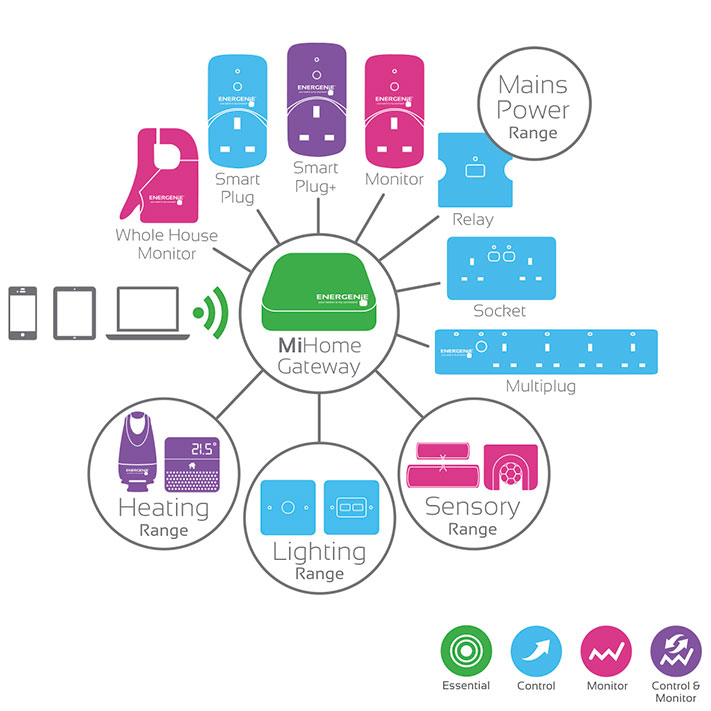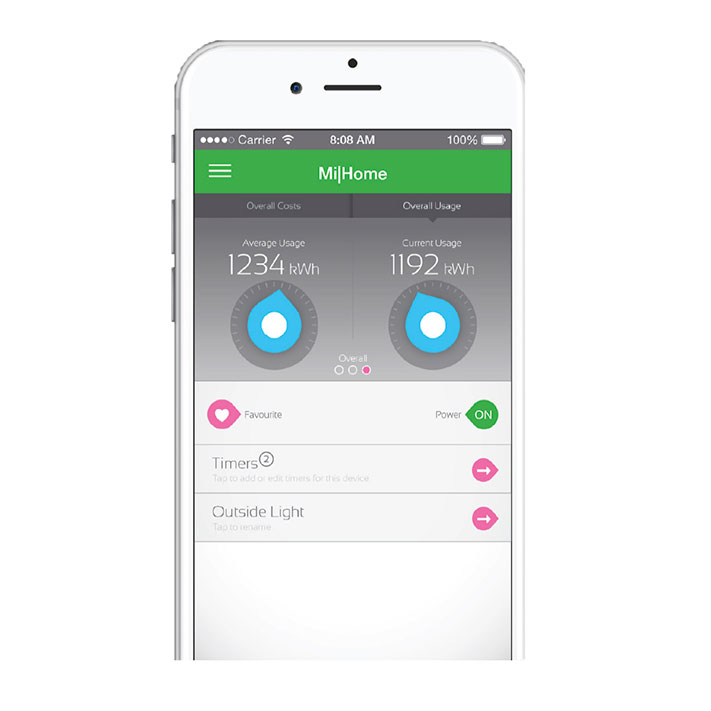
It looks like you're from the US.
We have a American shop which you can
purchase from if you'd like.
It's at: https://us.energenie4u.co.uk

It looks like you're from the US.
We have a American shop which you can
purchase from if you'd like.
It's at: https://us.energenie4u.co.uk
Please use the form below to request a call back.

You may well have heard the term 'Internet of Things' being mentioned in the media in the last few months, but what is it? And will it affect your life in any way?
The likelihood is that yes, it will have an impact on your everyday activities - but just because it's a tech term doesn't mean it's got to be complicated and confusing. Below, we tackle some of the jargon you might encounter and explain what it actually means.
Internet of Things (often abbreviated to IoT) - This is the idea that gadgets and devices can connect and talk with one another. For instance, your smartphone and your kettle can communicate - you press a button on your smartphone and the kettle boils, without you having to go into the kitchen to do it.
As you might expect, the internet is needed for this to happen - so all the term really means is things (appliances in your home) using the internet.
Smart - While experts struggle to agree on a precise definition, a smart device is one that’s connected to other things. So, a smartphone - like Apple’s iPhone or Samsung’s Galaxy - is connected to the internet and can carry out additional functions to that of a traditional phone.
In the same way, a smartwatch is often connected to your smartphone, and also has apps that connect you with other networks.
For the IoT, the phrase 'smart house' is beginning to be used - and this simply means that in your house, your devices are connected to one another.
The word smart is apt because, as the conventional meaning suggests, your devices are clever and can do additional functions.
M2M - This stands for Machine 2 Machine. It's very similar to the IoT, in that machines are talking to each other. However, it's more commonly used in industry and business, as opposed to referring to you, the consumer. In fact, it doesn't involve human intervention. Examples include weather sensing systems and automatic meter reading.
Actuator - An actuator is a device that moves or controls a mechanism when told to do so. An electric motor is an actuator, like you might find on an electric gate or in your car.
As the name suggests, an actuator puts something into action.
Gateway - A gateway is a device that connects two different networks, more often than not involving a connection to the internet.
This stands for If This Then That. It allows certain apps and programmes to work together and, as the name suggests, it works on conditions - If X happens, then Y happens. For example, you can link Facebook with your smartphone, so that if somebody tags you in a photo, you will get a text message. These conditions are known as recipes.
When it comes to the IoT, you can use IFTTT to set up recipes. For instance, if it drops below a certain temperature, then your heating will come on automatically - and vice versa.
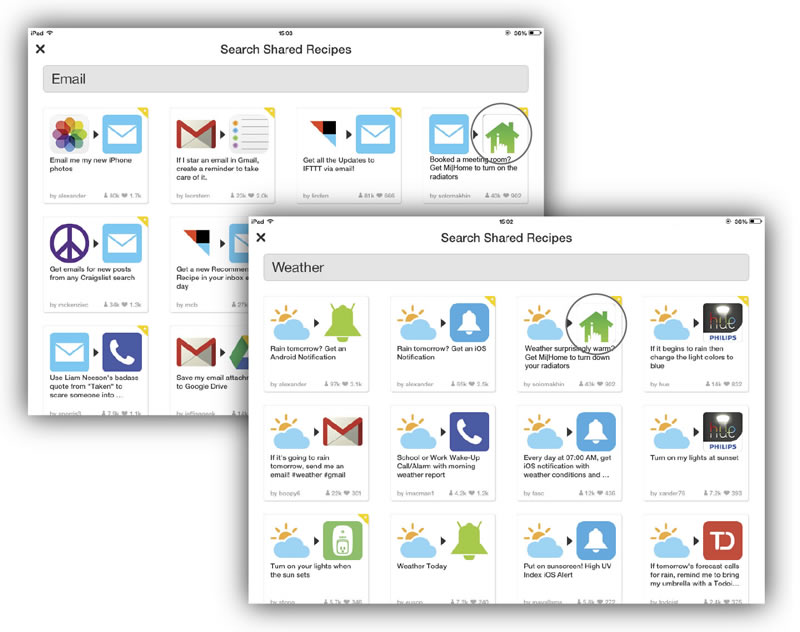
Geofencing is when a virtual boundary is established around a real-world one. When certain commands are activated when you enter a specific location, geofencing is the reason that this possible.
For instance, with the IoT you can set your heating to come on when you're within five miles of your house - so that no matter how long or short your day has been, you'll come home to warmth.
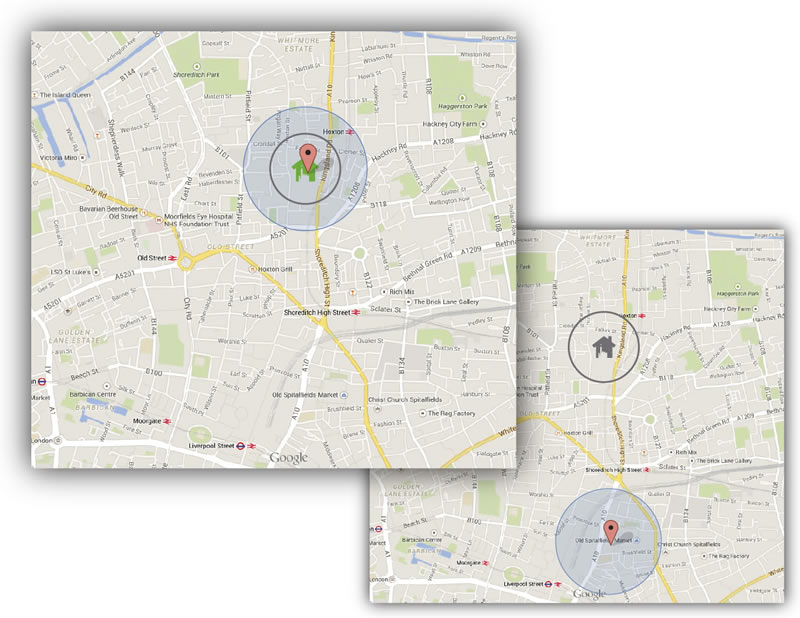
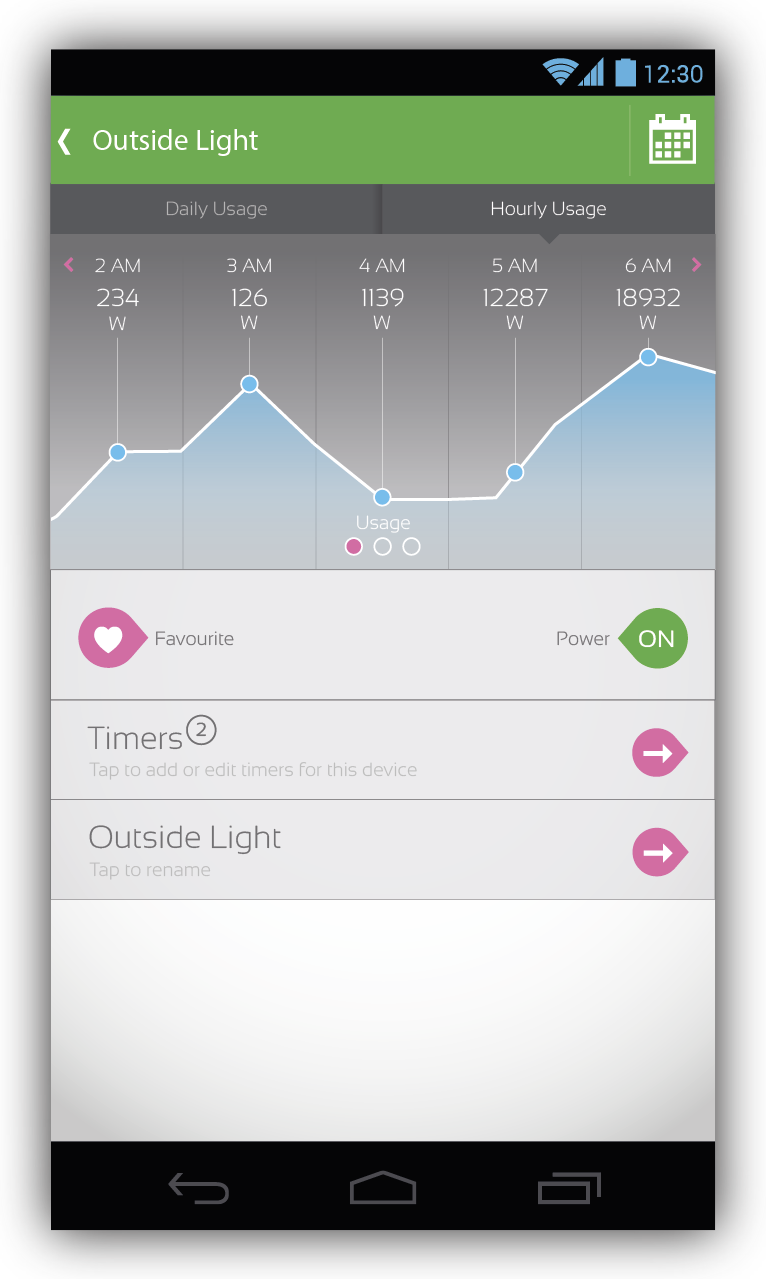
This all sounds good in theory, but will it actually work in the typical home? At Energenie, we think we've got a simple but effective way for you to make the most of this new technology and have your home more connected than ever before.
Mi|Home allows you to control and monitor the power, heating and lighting in your house remotely through either the Energenie app or on a PC.
This means you can specifically programme certain appliances to switch on or off at specific times, ensuring you're being strategic and cost-effective with how you're using the products in your house.
How does it work? We sell a product called a gateway that attaches to your router. This can then be connected to your phone, tablet or PC and, through the internet, you can control your appliances. It's really easy to connect - it comes with a QR code reader that means a single scan will set everything up for you.
The gateway controls actuators around your house. Here, the actuators are wall sockets, switches, adaptors and radiator valves that you can buy from us. These products implement the commands you issue.
We have a number of actuators that you can buy to start having more control around the house. These include the Mi|Home Adapter, which enables you to control devices and appliances.
Mi|Home offers three main features that will help you to revolutionise the way you live. Triggers, Timers and Geofencing (which we have already explained earlier).
Triggers allow you to combine the functionality of your Mi|Home devices with each other. An example would be that you can set the lights to come on with your Mi|Home Light Switch when your Mi|Home Motion Sensor detects any motion.
Timers help you schedule the Mi|Home system around your life. So you can set different times of the day that you want your devices to be turned on or off. Another example would be that you set your heating to come on at a certain time with Mi|Home Thermostat.
So, you can turn your heating down or your lights off through a simple touch of a button through the dedicated - and free - Energenie app. Or set up routines so these things will automatically happen at certain times, depending on what time of year it is or what your typical week looks like.
One example recipe could be: "Turn my heating on at 5pm, but only if the outside temperature is below 16 degrees C and I am within five miles of my house".
If you fancy yourself as a tech whiz, you'll be pleased to know that Raspberry Pi can be used as an alternative command hub, meaning you can create your own flavour of command tools.
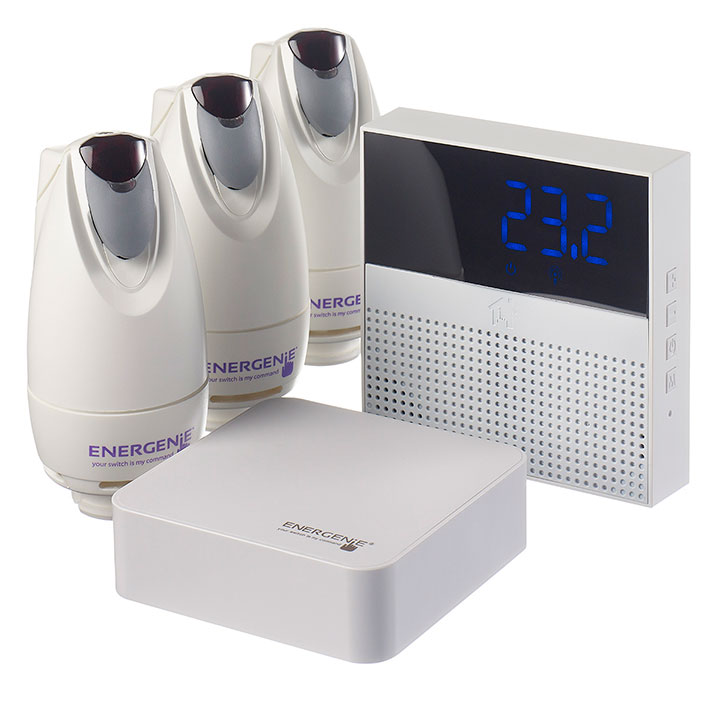
Our ethos is to make your life that little bit simpler and easier - and we believe the Mi|Home product range does exactly that.
Through this system, you can choose to turn the radiators on in individual rooms, so only the rooms you actually use are hot.
This means you can programme specific radiators to be on before you get up in the morning, or ensure that certain rooms will be warm by the time you get back from work.
You're also saving money on your energy bill because you're not needlessly heating up rooms you don't always use, such as a guest bedroom or a study.
Considering the average cost of gas increased by 123 percent between 2004 and 2014 (1kWh cost 1.41p in 2004, compared to 3.15p in 2014), and that the average cost of electricity has sky-rocketed by 177 percent in the same time frame (3.89p to 10.79p), every penny really does count.
As mentioned earlier, smart radiator valves can use IFTTT and geofencing to respond to the outside temperature, meaning that you can link up your weather app on your smartphone so that, no matter what the weather, your house can be one step ahead.
It's likely you'll be conscious of not leaving lights on when you leave the house. But in that morning rush to get out the front door on time and not be late for work, it's a simple thing to forget. You can use our products to make lights turn off at certain times, so you know you're not unnecessarily using electricity. By using other apps, you can work out when it'll get dark and when your lights should come on so it's not pitch black when you get home in an evening.
On the contrary, if you want lights to come on at specific times while you're on holiday - to make it look like someone's at home to deter burglars - you can make this happen with Mi|Home timers.
As with the radiator valves, you can change the routines that you've set up if your day takes a different turn than you expected. As long as you're connected to the internet, you can use the Energenie app anywhere and ensure you're completely in control of your lighting.
You can also take advantage of our smart adaptors, which can turn your appliances into smart Wi-Fi devices. This means you can control them remotely - whether you're in or out of the house - and you can also group them together, so they come on at the same time. What's more, you can match your routine with the Mi|Home range to make your life that little bit easier.
We've mentioned the potential money savings, but this could be even more important with the dawn of time-of-day tariffs, which means that energy costs vary depending on what time it is. It'll be even more wasteful to not be strategic about when your heating, lighting and appliances are in use under this system.
Our solution also affords benefits to those who have elderly relatives or friends living on their own. You can remotely control their heating through your smartphone, tablet or PC to ensure their house is warm at the right times. This gives you peace of mind that your loved one is comfortable at home.
The IoT could completely revolutionise the way we live our lives - in fact, chief executive of Cisco John Chambers believes the IoT philosophy will have five to ten times the impact that the internet has had on the world.
Future potential advancements include having all your appliances talking to each other - the refrigerator, washing machine - even your bed! This is so far removed from our daily reality that it can be quite hard to wrap your brain around it. It would have been impossible to work out the effects the internet would have had on every area of society 20 years ago, so it's not surprising the same is true for the IoT.
The digital revolution that has taken place already is staggering. In 2003, there were 500 million connected devices, equating to 0.08 such products per person. In 2010, the figure skyrocketed to 12.5 billion, meaning each person had the equivalent of 1.84 connected devices.
While Cisco expect this to be 6.58 in 2020 as there will be 50 billion connected devices in circulation for the estimated 7.6 billion people on the planet.
However, some have their concerns about this philosophy when it comes to security. As more and more devices are connected, there is a risk of data breaches.
Some people are worried their devices could get hacked and these unscrupulous individuals could gain access to their houses. While this is understandable, many are working hard to ensure this doesn't happen - and at Energenie, we consider your protection and safety to be of the utmost importance. We will never sell products that we don't believe adhere to the highest security measures.
